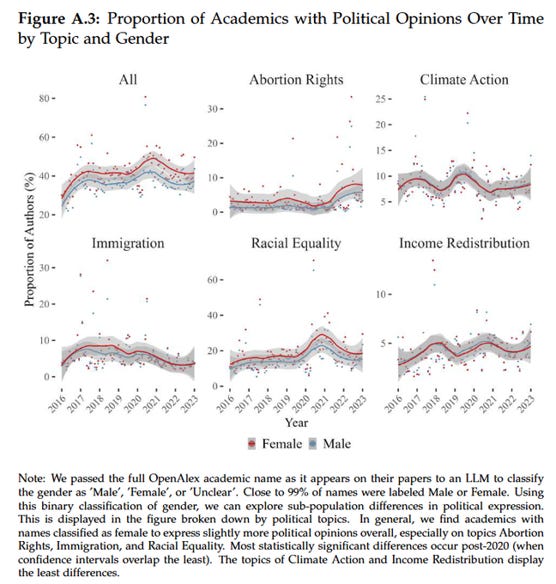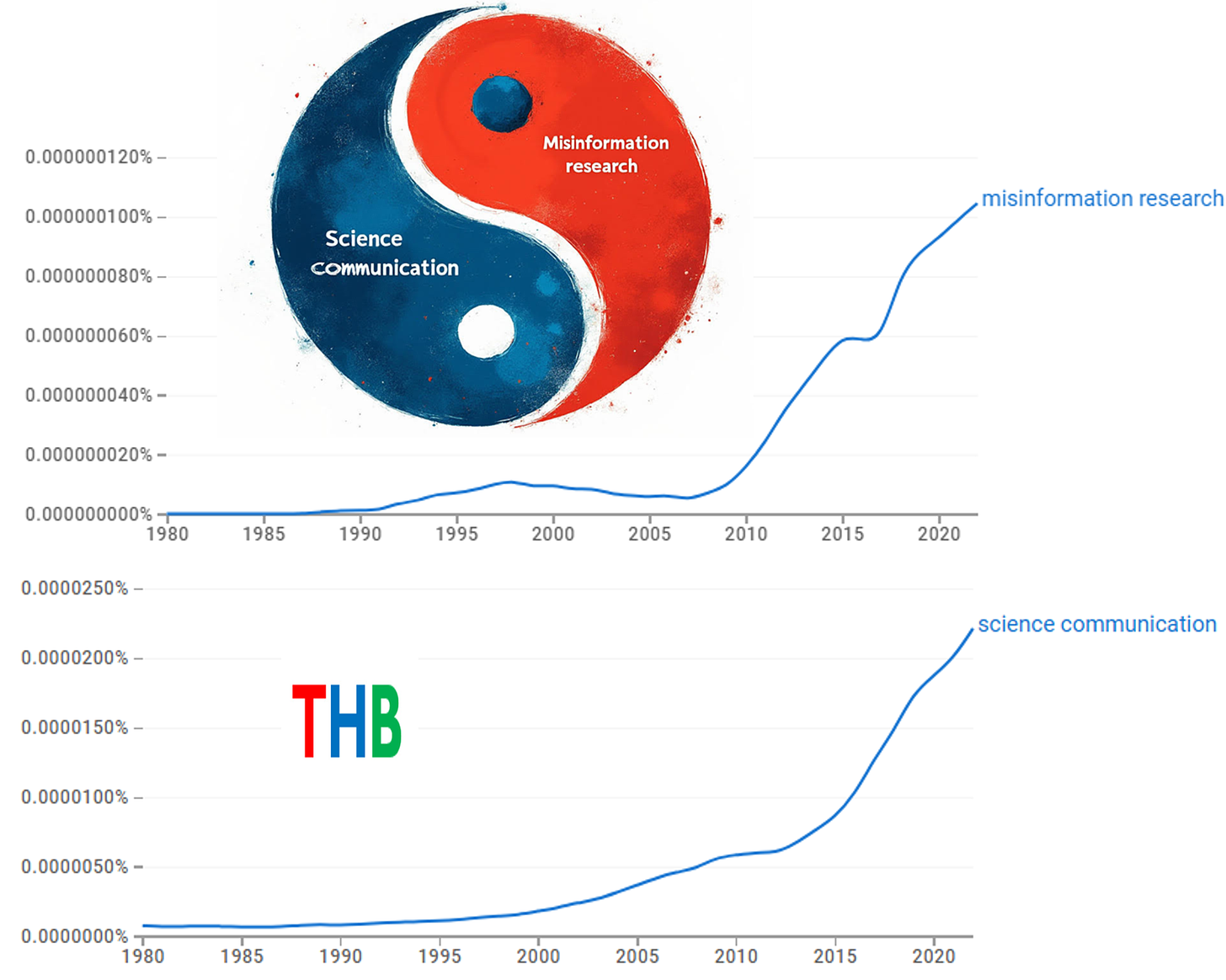This is Part 3 in the THB series, Politicization of the American University, following Part 1 — The Problem, and Part 2 — Partisan Professors.
The first two installments in this series have documented two important trends — First, across the board, public confidence in universities has dropped, especially among conservatives and the working class. Second, at the same time, the self-described political views of university faculty have moved sharply to the progressive left. A core thesis of this series is that the pathological politicization of the academy helps to explain the dropping public trust in universities — and the path to regaining public confidence runs through depoliticization.
Today, in Part 3, I explain important reasons underlying the politicization of universities. Specifically, the changing societal context within which universities — and indeed the entire scientific enterprise — operate, created incentives for institutions and individuals to politicize. These incentives influenced the work done at universities in the direction of advocacy and also the characteristics of those seeking university careers, becoming much more appealing to partisans.
Let’s start with the fall of the Berlin Wall in 1989.1 The end of the Cold War marked the end of the post-World War 2 consensus on the role of scientific research in its broader societal context, expressed in Vannevar Bush’s famous and often mythologized 1945 report, Science — The Endless Frontier.2
The consensus held that in exchange for public support,
"the researcher was obligated to produce and share knowledge freely to benefit—in mostly unspecified and long-term ways—the public good"
In 1995, on the 50th anniversary of the Bush report, Rad Byerly (RIP) and I characterized this general agreement as a social contract, one that was necessarily undergoing change:
[W]ith the Cold War ended, science is adapted to an obsolete environment. Other environmental changes include (i) a dissatisfied public ready to reduce the federal government's size and reach; (ii) deficit-reduction strains on funding, leading to many program reductions; (iii) increasing public awareness of problems that neither science nor government has resolved, including racism, drug abuse, breakdown of community, and crime; and (iv) two decades of decay in real wages, leading to politics focused on the grievances of the middle class. Science competes for funds that otherwise might address such problems directly. Problem resolution will become increasingly important in justifying support for science. Legislatures challenge research universities to contribute more to society, to better educate undergraduates, and to study practical problems.
We argued that the changing societal context meant that policy makers and the public would expect research institutions, including universities, to be more accountable to serving societal needs. We urged the scientific community to take a leadership role in forging a new social contract centered on public accountability and many societal benefits of science and technology.
Through the 1990s and 2000s, we did indeed see greater pressures for more accountability from the scientific community. One consequence of these pressures were demands from funders that researchers demonstrate impact.3
One crucially important example of this dynamic occurred in 1997 when the National Science Foundation (NSF) — a leading federal funder of university-based research — changed its merit review criteria for evaluating research proposals. The two new criteria announced in 1997 were intellectual merit and broader impacts, and were to be considered as equally important.
NSF suggested questions reviewers should ask in judging the broader impacts of proposed research:
How well does the activity advance discovery and understanding while promoting teaching, training, and learning? How well does the proposed activity broaden the participation of underrepresented groups (e.g., gender, ethnicity, geographic, etc.)? To what extent will it enhance the infrastructure for research and education, such as facilities, instrumentation, networks, and partnerships? Will the results be disseminated broadly to enhance scientific and technological understanding? What may be the benefits of the proposed activity to society?
Education, participation, infrastructure, dissemination — these are all straightforward. It is the last question on the “benefits to society” which reflected a well-meaning effort to increase public accountability, but also opened a door to pathological politicization.4
Anticipating the benefits to society of research can be challenging if not impossible, as a large share of research is not problem oriented (e.g., finding a cure for cancer) but is instead much more narrowly focused (e.g., how the mass balance of the Greenland ice sheet changed over the past 10,000 years). In fact, understanding the societal impacts of research is itself a significant focus of research.
One consequence of demands that researchers assert the benefits of their research to society to justify their funding was inevitably that some researchers would make claims about the importance of their work for addressing specific policy issues. Most researchers of course are not policy experts, so justifying ones research in terms of policy risked meaningless handwaving or worse, slipping into overt political advocacy.5
To be sure, demands that researchers demonstrate impact are not limited to the review criteria of the NSF or to the United States — they became ubiquitous across scientific institutions, including universities.
For many researchers, the obvious response to demands to be relevant to society was simply to become more politically engaged. In 2006, Paul Starobin in the National Journal characterized the consequences:
Inevitably the scientist has been dragged, or has catapulted himself, into the values and political combat that surround science and has emerged, in certain respects, as just another (diminished) partisan.
The election of George W. Bush coupled with some conservative politicians taking issue with scientists over issues like climate change and stem cells, helped to motivate the acceleration of partisanship in the academy. It takes two to tango, and scientists and their political opponents both welcomed the battle.
As Dan Sarewitz explained in 2010:
During the [GW] Bush administration, Democrats discovered that they could score political points by accusing Bush of being anti-science. In the process, they seem to have convinced themselves that they are the keepers of the Enlightenment spirit, and that those who disagree with them on issues like climate change are fundamentally irrational. Meanwhile, many Republicans have come to believe that mainstream science is corrupted by ideology and amounts to no more than politics by another name. Attracted to fringe scientists like the small and vocal group of climate skeptics, Republicans appear to be alienated from a mainstream scientific community that by and large doesn’t share their political beliefs.
Almost 15 years later, the notion that scientists and the institutions they inhabit should be fierce political advocates promoting progressive causes has become normalized. Consider just a few recent statements reflecting a contemporary community norm:
Science: “Scientists, at least some, must recognize and lean into their role as political actors.”
Nature: “Influencing policymakers might not feel like part of a researcher’s role. But it should be.”
Scientific American: “[P]olitical advocacy is no longer anathema to scientific research, but should be embraced as a central aspect of science’s social mission.”
A phrase popularized starting about 20 years ago — science communication — characterized one increasingly popular approach to demonstrating impact. Some (e.g., here and here) cautioned against seeing science communication in terms of overt or stealth advocacy. Overall, the field reflects a turn within the academic community to institutionalize and legitimize political advocacy.
A new preprint (Alabrese et al. 2024) provides some incredible data on political expression by almost 100,000 U.S. academics on X/Twitter from 2016 to 2023. The figure below shows that a minority of academics on X/Twitter actually express political opinions on the platform. Most academics are not social media partisans, but the ones who are are disproportionately characterize themselves as being on the far left of the political spectrum.

The preprint also concludes that:
Academics are far more willing to express political opinions than overall users of the X/Twitter platform;
On climate change, academics display much narrower political diversity than overall users, but on racial equality academics display much greater political diversity;
STEM academics are much more political related to climate change than are social scientists;6
Academics who express political opinions on the platform suffer a reputational penalty with the public, and many think that is OK.
Some practitioners of science communication have not limited themselves to advocacy for policies, politicians, or a cause — and have gone further to try to limit the expression of others in the academic community whose views they disagree with or do not think to be helpful for advancing their causes.7
In 2017, journalist Keith Kloor labeled these activists the “science police” and explained:
[H]ighly charged issues, such as climate change, engender the most active policing in the scientific community and that the intensity of this policing is proportional to the perceived influence of the person on the receiving end of it. I’ve also observed another common strand: those in the scientific community who become preoccupied with the public interpretation or political implications of scientific findings tend to deputize themselves as sheriffs of scientific literature and public debate.8
Such policing has become institutionalized in the creation of a new field of study, called misinformation research, in which certain professors appoint themselves as arbiters of truth in scientific and public debates. Like most academics, the self-described political views of misinformation researchers are skewed far to the political left.
Together, large parts of science communication and misinformation research comprise the yin and yang of today’s pathologically politicized academic enterprise. The former is about promoting the right messages, and the latter is about preventing others from promoting the wrong messages.
The figure below shows time series from Google Ngrams showing the prevalence of words and phrases in the corpus of English-language books for “misinformation research” and “science communication.” You can see a sharp increase in both phrases coinciding with the increasing politicization of universities — “Science communication” took off around 2000 and “misinformation research” in 2010.

Several nuances are important. First, scholars in the “disciplines” of science communication and misinformation research are not uniform in their commitment to political advocacy or viewpoint policing — some push back against these types of politicization. Second, the dynamics here are not at all limited to these two areas of research — science communication and misinformation research represent the institutionalization of a more general perspective that arguably has spread throughout academia.
This general perspective holds that faculty and their research ought to be judged by political criteria — Simply put, do they hold and express the “correct” views?
An example of how this dynamic became institutionalized in our universities can be found in the course-correction decision last week by the University of Michigan to eliminate the requirement that its faculty prepare statements on diversity, equity, and inclusion, with a faculty committee concluding:
[C]ritics of diversity statements perceive them as expressions of personal identity traits, support of specific ideology or opinions on socially-relevant issues, and serve as a “litmus test” of whether a faculty member's views are politically acceptable. Thus, as currently enacted, diversity statements have the potential to limit viewpoints and reduce diversity of thought among faculty members.
Several months ago a faculty advisory committee at Michigan characterized more general issues with the pathological politicization of their campus — consistent with the analysis of this THB series — based on interviews and surveys:
Evidence shows diversity of thought is lacking, as most respondents agree that liberal or progressive voices dominate the conversation. Deficiencies in constructive disagreement are compounded by social pressure that silences people who disagree with prevailing perspectives. Individuals holding conservative, libertarian, and traditional Christian views report significant pressure to self-censor.
Both conservatives and liberals worried that the climate of opinion at UM was overwhelmingly liberal or progressive. Conservatives felt that many people at the University presumed that left-wing views were correct, that everyone agreed with them, that there was nothing to be said in favor of conservative views, or perhaps that most others were oblivious of conservative views.
The committee was open-eyed about the depth of the problem:
[C]ommunities such as ours must create an environment where respectful engagement and debate flourishes. Such an endeavor is a long-term project, one that will inevitably come with setbacks. It cannot be achieved in one summer or one year.
I agree. We’ve made a really mess of things and it is going to take a while to correct course. Until we do, we will not have earned the public’s trust.9
Next week, in Part 4, I will take a close look at how deeply climate activism has become institutionalized at the University of Colorado Boulder.
The easiest thing you can do to support THB is to click that “♡ Like”. The more likes = the higher this post rises in the Substack feeds and then THB gets in front of more readers!
I have plans for two more installments in this five-part series, appearing each Monday leading up to Christmas. Here is what you can expect:
Part 1: The Problem
Part 2: Partisan Professors
Part 3: How Universities Got Off Track
Part 4: My personal experiences as climate advocacy took root, spilling some tea
Part 5: Where from here? Let’s right this ship
Thanks for reading! Posts like these take a lot of work and are the result of your support, which makes THB possible. Please consider a subscription upgrade. As always, comments, questions, conversation, critique, and correction are invited.
I could have started it with Plato, the Morill Act of 1862, or the Allison Commission of 1884-1886, but that deeper dive will have to wait for the book-length version of this series!
To be sure, debates over science policy and the role of universities have a rich and complex history. See my 2020 article commemorating the 75th anniversary of the Bush report, which I begin as follows: “If I have to read another article about Vannevar Bush I’m going to throw up.”
Demand for demonstrations of research impact are certainly not limited to the US — The UK, for instance, has also developed a significant focus on impact..
In the decade or so after the implementation of the new NSF proposal review criteria I was deeply involved in NSF panel reviews and read hundreds of proposals. The trend toward politicization of research motivated by efforts to address the second review criterion was clear in real time.
As I’ve said throughout this series, and will no doubt say again — academic freedom means that individual faculty members are free to advocate for whatever causes they wish. It is when political advocacy becomes institutionalized that universities depart from their missions. We might also ask if researchers who express their thoughts on how their research relates to policy in an NSF proposal adds any value for those evaluating the proposed research.
This has also been my observation of online climate researchers as well.
From this perspective, the real significance of the 2009 leak of emails of climate scientists known as Climategate was not that it showed that climate science was fraudulent, but instead, it revealed the climate police (a very small but influential subset of the community) hard at work — Things have not really changed.
Working on this series has helped me to understand that my 2007 book, The Honest Broker — which gives this site its name — was actually me trying to grapple with the increasing politicization of science and academia.





Thanks Roger for the pointer to the UM report, which makes for somewhat encouraging reading. I was struck by this part:
"Subcommittee Three was asked to consider “[w]hether the University should adopt some form of the University of Chicago’s Kalven Principles, which establish ‘[a] heavy presumption against the University . . . expressing opinions on the political and social issues of the day.’” Subcommittee Three answered “in the affirmative.”
If only the major scientific societies could likewise be convinced to stop issuing position statements. The American and Canadian Economic Associations are both constitutionally forbidden from doing so. By contrast the AGU, AMS, AAAS etc. long ago gave in to the temptation with all the negative repercussions noted in the UM report. On your dad's blog many years ago I wrote a guest post on this topic and the then-president of the AMS joined in the comments to respond (needless to say I didn't convince him). I guess the leaders of these groups thought that by issuing position statements on climate change they would change public opinion. They were right, but in their hubris they misunderstood what the resulting change would be.
Roger, the weekend Wall Street Journal has an excellent article (p. A11 Dec. 7-8 WSJ) about Jay Bhattacharya's time spent as a "non-person" and subsequent rise from the ashes to be nominated for head of NIH. His story vividly illustrates the dangers of the politicization of universities and scientific institutions. Bhattacharya's university "investigated" him for "conflicts of interest" to cast doubts about his research proving that COVID was a great deal less deadly than public-health authorities were claiming. "Progressive" authority figures thought that fact had to be suppressed because the CDC and NIH apparatchiks believed it was a virtue to panic the population about COVID so people would submit to control and loss of liberty. Government bureaucrats will do that sort of thing; the shame of it was that Bhattacharya's university went along and actively connived at smearing Bhattacharya's reputation for political goals. Bhattacharya was consistently right on issue after issue about which the CDC and NIH were completely wrong, but JB's voice was suppressed at a time when the nation very much needed to hear it. I suggest you have a look at the article; I thought it was highly relevant to the dangers of politicized groupthink in those claiming to "represent science" (Fauci's words).